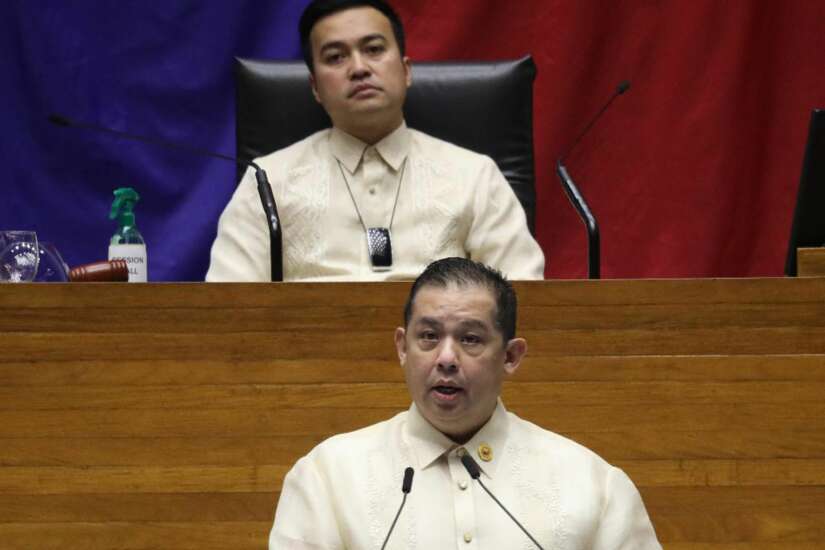HOUSE Majority Leader and Leyte Rep. Martin G. Romualdez on Friday said at least seven priority bills of Speaker Lord Allan Velasco are eligible for swift approval under Rule 10 Section 48 of the House of Representatives.
Under Rule 10 Section 48, Romualdez said it authorizes the committees to dispose of priority measures already filed and approved on third reading in the immediately preceding Congress.
“We discussed ways on how to expedite the approval of pending legislative measures in compliance with Speaker Velasco’s directive to hit the ground running,” Romualdez, chairman of the powerful House Committee on Rules, said.
“The concerned committees for these measures may meet for just one hearing and immediately refer the committee reports for plenary deliberation by invoking Section 48 of the House rules,” explained Romualdez, a lawyer and president of the Lakas-Christian Muslim Democrats (CMD) and Philippine Constitution Association (Philconsa).
Rule 10 Section 48 provides that: “In case of bills or resolutions that are identified as priority measures of the House, which were previously filed in the immediately preceding Congress and have already been approved on third reading, the same may be disposed of as matters already reported upon the approval of majority of the members of the committee present, there being a quorum.”
The seven priority measures of Velasco pending in various stages of deliberation in the committee level that are eligible under Section 10 Rules 48, Romualdez said, include the Coconut Levy Fund, National Land Use Act, Mandatory Reserve Officers’ Training Corps or ROTC, Rightsizing the National Government, Right to Adequate Food, Anti-Ethnic, Racial and Religious Discrimination Act, and On-Site, In-City Near City Local Government Resettlement Program.
In his recent meeting with Velasco, Romualdez said the Speaker is also eyeing the immediate approval of the following proposals as his priority bills: Ordaining the Development of the Downstream Natural Gas Industry, Internet Transaction Act, Military Uniformed Personnel (MUP) Pension Fund, Magna Carta for Barangays, Amendments to the Revised Penal Code, Amendments to the Government Procurement Reform Act, Marinduque Special Economic Zone Act, Marinduque Sports Academy and Training Center Act, and Bisekleta Para sa Kinabukasan Act.
“All other priority measures to be identified by the Speaker as his priority bills are expected to face easy sailing in the House of Representatives,” Romualdez said.
Earlier, Romualdez forwarded an initial list of anti-corruption bills to Velasco for possible inclusion in the House legislative agenda to boost President Rodrigo “Rody” Duterte’s campaign against corruption in the government.
Velasco and Romualdez earlier vowed to heed the directive of Duterte to intensify efforts against corruption in the government.
The five measures are Sorsogon Rep. Evelina Escudero’s House Bill (HB) No. 7230 which seeks to augment the financial resources of the Office of the Ombudsman by giving it a 30 percent share in any property forfeited in favor of the State under Republic Act (RA) No. 139, otherwise known as the Forfeiture Law; HB Nos. 581 and 6003 which requires the inclusion of anti-corruption and governance education in the basic education and higher education curriculum, respectively, and both filed by CIBAC party-list Reps. Eduardo Villanueva and Domingo Rivera; Cavite Rep. Francis Abaya’s HB No. 967 which seeks to provide protection and benefits to persons who would report corrupt officials and would serve as witnesses for their prosecution; and HB No. 579 which seeks to create the National Independent Commission Against Corruption (NICAC) as an attached agency of the Office of the Ombudsman, also filed by Villanueva and Rivera.
All measures have been pending at the committee level.
Last Tuesday, Romualdez said the House leadership included 12 economic measures in the list of bills prioritized for floor and committee deliberations to help the Duterte administration jumpstart the economy and cushion the impact of the coronavirus disease-19 (COVID-19) pandemic on the livelihood of ordinary Filipinos.
The Majority Leader noted that the 12 economic measures are what remain of a total of 22 bills that were endorsed as priority measures by the country’s economic managers to the 18th Congress.
The 10 other measures had already been passed by the House of Representatives, but remain pending in the Senate.
The five measures still under plenary deliberation are House Bill (HB) 7749 or the Government Financial Institutions Unified Initiatives to Distressed Enterprises for Economic Recovery (GUIDE), HB 7425 or the Digital Transactions Value Added Tax, HB 7406 or Bureau of Fire Protection (BFP) Modernization Program, HB 6135 or Fiscal Mining Regime, and HB 7425 or Internet Transactions Act/E-Commerce Law).
Pending under committee deliberations are the Military and Uniformed Personnel (MUP) Services Separation, Retirement, and Pension Bill; Armed Forces of the Philippines (AFP) Modernization Bill; Coconut Farmers Trust Fund Bill; Department of Water Resources and Water Regulatory Commission Bill; Warehouse Receipts Bill; National Disease Prevention and Management Authority Bill; and the National Land Use Bill.
The 10 economic measures that were already passed by the House were HB 4157 or Corporate Recovery and Tax Incentives for Enterprises (CREATE) Bill; HB 6816 or Financial Institutions Strategic Transfer (FIST) Bill; HB 6654 Converting the Insurance Commission into a Collegial Body; HB 6768 or the Financial Consumer Protection Bill; HB 6136 or the Motor Vehicles User Tax; HB 6134 or Rural Agricultural and Fisheries Development Financing Systems Act; HB 300 or Foreign Investment Act Amendments; HB 78 or Public Service Act Amendments; HB 59 or Retail Trade Liberalization; and HB 6927 or E-Government Act.

